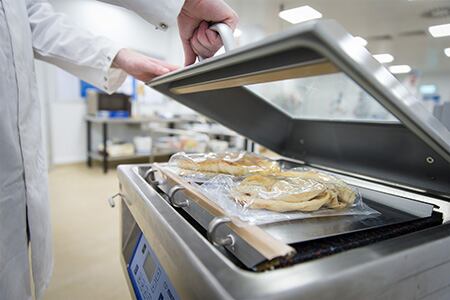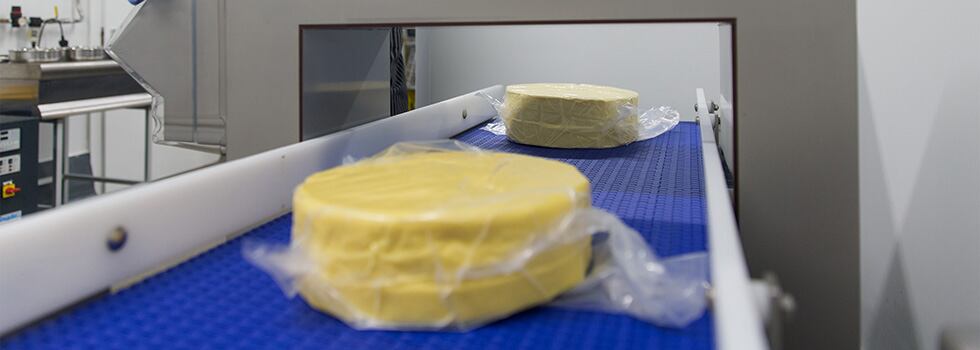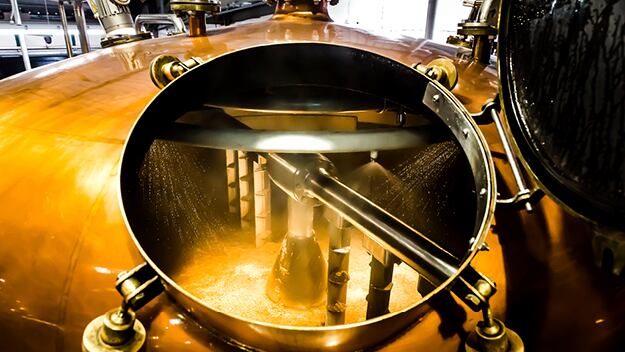Wales has become the premier location for investment, R&D and innovation and is now the natural base for leading food and drinks companies.
When it comes to the food and drinks industry, Wales has some impressive statistics to boast about, and despite its size – with a population of just 3 million – the numbers are big: a £16.8 billion turnover in the supply chain, providing a £4.2 billion gross value added (GVA), 224,000 people employed across the sector, 27,000 business units and 174 Great Taste Award winners.
Of course, this hasn’t happened by chance, and the strength of the food and drinks industry in Wales is a result of collaboration between the Welsh Government, industry itself, the workforce and colleges and universities, resulting in a joined-up strategic approach, combining expertise, ambition, innovation and R&D, with financial and practical support.
As with all great strategies, this one has a name, targets, a structure and, crucially, investment behind it: ‘Towards Sustainable Growth – An Action Plan for the Food and Drinks Industry 2014-2020’ has ambitions to grow the food and drink industry in Wales by 30% by the end of this decade.
The rewards of successful research and development (R&D) can be significant for those producing food and developing new food products. But it is also a risky business. R&D requires investment in resources, people and expertise. The Welsh Government is particularly proud of the way that it supports food businesses to exploit R&D to help them open up new markets, boost sales and increase profitability. Funding is available to take businesses through every phase of R&D from initial feasibility to market exploitation, including experimental development.
Underpinning this strategic ambition is an impressive infrastructure of food innovation centres, university R&D and skills training, right across the nation.
Supporting innovation and nurturing ambition
The food industry has become an increasingly complex arena in which to operate: with global competition, a greater focus on price, complicated procurement and increasing ethical and environmental concerns; developing or growing a food business in this context is a real challenge. It is no surprise, then, that companies may fail due to lack of expertise or resource in specific areas.
That’s where Food Innovation Wales comes in, with input from colleges and the university sector, and an experienced team of consultants, food centres across Wales support the food industry by providing advice and encouragement, technical support, innovative ideas and guidance on regulatory and legislative complexities.
Backed by the Welsh Government, Food Innovation Wales’s team of internationally recognised food industry experts are available to help clients navigate their way through a complex range of food disciplines, from nutrition and dietetics, environmental health, new product development, factory and workplace design, quality assurance, hygiene and food safety and marketing and finance.
With decades worth of experience, Food Innovation Wales is dedicated to helping food businesses to grow, innovate, compete and reach new markets. Each of the centres hosts an experienced and dedicated team of experts and equipment, to advise and support businesses in Wales. Services offered include: product development; labelling and packaging advice; sensory evaluation; legal advice; nutritional analysis; food preparation training and process and factory design.
This wide range of support means that new and established businesses can gain practical industry advice and guidance about any aspect of setting up a business.
One of the food centres specialising in research and development aspects of the industry is Cardiff Metropolitan University’s Zero2Five Food Industry Centre which draws on expertise from across the university, including Food Science, Nutrition, Dietetics, Environmental Health, Trading Standards and Biomedical Sciences, to support food businesses and help them to compete more effectively in the global marketplace. The team advise on baking, dairy and meat technologies, hygiene management, packaging design, technical management systems and new product development. Informed by the latest research, and hosting a number of state of the art facilities, from modern kitchen design and technology to cutting edge food processing areas, the Zero2Five Food Industry Centre is world leading.
Little wonder then that Food Innovation Wales has become the go-to body for support, advice and creative ideas to help food and drinks companies expand and grow, catering for the needs of suppliers, multinational food manufacturers or those taking their first tentative steps to set up a culinary micro business.
Dawn Meats, with an annual turnover of over £1 billion and exporting its meat products to over 40 countries, has been one such company in receipt of food centre support. Marcus Sherrand from Dawn Meats, which has a retail packaging facility in south Wales, explains: “As the product development work involves a lot of experimenting, the use of the extra equipment means that we do not need to purchase equipment that we might not need if the trial product is not adopted.”
Enhance Drinks Ltd, whose products are available from major UK supermarkets, is another company which has been in receipt of the Food Innovation Wales services, helping the company launch a new product. Jill Casebury of Enhance Drinks Ltd, explains: “The technical expertise was brilliant, and the flexibility in using the equipment was great. The facilities were excellent. We were able to use Food Innovation Wales to create a pilot product.”

Research and Development
Meanwhile, another key ingredient to success is that universities across Wales are conducting world-leading research which benefits the food and drink industry at every stage of manufacture and production.
The long-established Institute of Biological, Environmental and Rural Sciences (IBERS), based at Aberystwyth University is an internationally-recognised research and teaching centre providing a unique base for research in response to global challenges such as food security, bioenergy and sustainability and the impacts of climate change. IBERS' scientists conduct research on genes and molecules, whole organisms and the environment.
IBERS has strong and long-established relationships with industrial partners that enable it to play a fundamental role in supporting the productivity of the UK agri-food sector. Food safety researchers are working to make food plants drought-resistant and improve the identification of contaminated carcasses, while nutritionists are exploring ways to use enzymes as a source of fibre. The Institute is also developing new varieties of oats used extensively for human and animal consumption; a market that is growing at around 5% per year. It is estimated that IBERS’ contribution to the UK oats market generated more than £19 million GVA for the UK economy in 2012/13 and supported more than 800 jobs.
Glyndŵr University’s Centre for Water Soluble Polymers has a long history of technology collaboration and partnership with international food companies including The Findus Group and Unilever. The Centre analyses ‘hydrocolloids’ that are widely used as thickeners, gelling agents, dispersants, emulsifiers and foaming agents in a broad range of industrial formulations including food. One research project found that pectin from sugar beet pulp, a by-product of the sugar industry, had a further potential application as an emulsifier for flavour oils for the drinks industry.
Researchers at another north Wales university, Bangor, are at the forefront of research, development and the commercial application of bio-based alternatives to synthetic materials in manufacturing and industry, including food packaging. The centre’s mechanical and physical testing facilities, and its chemical analytics capabilities, are unique in the UK, and it supports companies to develop improved food packaging with a reduced environmental impact – from proof of concept right through to commercial application. Examples of feedstocks which have been evaluated at the centre include wheat straw for use as an alternative to polystyrene in pizza packaging and ryegrass for the production of egg boxes.
Investment
Investment is part and parcel of the food and drink success story in Wales. Public and private sector investment go hand in hand to create what is today a £16.8 billion turnover.
The Welsh Government’s stated aim is to confirm Wales’s position at the forefront of food production, and as such Wales provides financial support to help fund capital investment, job creation, research, development and innovation and certain eligible revenue projects, with quick decisions and approvals.
With a skilled and highly-productive workforce, financial and practical support from the Welsh Government and experts at state-of-the-art facilities based in the food innovation centres, combined with first-class research and development led by universities, little wonder that leading global food manufacturers are increasingly seeing the sense of locating in Wales including Kellogg’s, Unilever and Pinnacle Foods.
But it’s not just the established players who can benefit, and smaller companies with big growth ambitions are enjoying the Welsh experience, too.
Calbee, the No 1 Japanese snack manufacturer, making savoury snacks for the global market, established a base in Deeside, North Wales, in 2015. The company has received support from the Welsh Government financially and technically.
When Easibake (part of the Evron Food Group) was looking for a helping hand to locate part of their baking empire elsewhere in Europe, they tested out the Welsh Government offering, and weren’t disappointed. Morris Evans from Easibake summed it up when he said: “We asked Wales for the highest level of support and we asked them to respond quickly; they found us the Newport (south Wales) site and a package of aid that was possible from nowhere else.”
A solid platform for growth
It is clear that the money, effort and expertise ploughed into the industry right across development, research and manufacturing, is paying dividends, even in these challenging economic times: the Welsh Government recently reported that turnover in the food and drink sectors in Wales was up 17% since the launch of their Action Plan for the industry in 2014.
The industry is flourishing, supported by a loyal Welsh workforce that research suggests is more productive and efficient than their counterparts elsewhere.
It can be said with confidence that the food and drink produced in Wales is outstanding, competes on the world stage and that the future is bright…and tasty!





